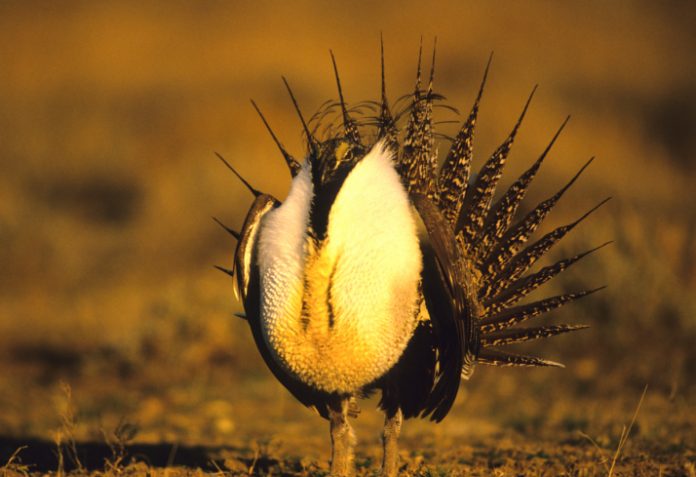The chief judge of the U.S. District Court for the District of Montana invalidated Trump-era oil and gas lease sales, citing a failure to comply with Obama-era regulations for the greater sage grouse.
The decision applies to leases in Nevada and Wyoming and follows that judge’s earlier cancellation of Trump-era oil and gas lease sales in Montana and Wyoming.
On appeal, Chief Judge Brian Morris’ action is likely to be combined with a case currently pending before the Ninth Circuit Court of Appeals challenging his earlier lease sale cancellations.
Green, Green Grouse of Home
As in the previous case, Morris, a President Barack Obama appointee, ruled the leases failed to comply with Obama-era sage grouse protections ostensibly aimed at preserving habitats.
Although the greater sage grouse is not listed as threatened or endangered under the Endangered Species Act, a subspecies, the Gunnison sage grouse, was listed as “threatened” in 2014 by the U.S. Fish and Wildlife Service during the Obama administration.
Morris had earlier invalidated the Interior Department’s 2018 instruction memorandum on sage grouse conservation, which prioritized leasing outside of sage grouse habitat only when there was a backlog of leasing requests and told agency officials to ignore a 2015 regulatory resource management plan regarding the bird.
In his new ruling, Morris said a proper reading of the Obama-era plan requires the Bureau of Land Management (BLM) to exclude any parcels with greater sage grouse habitat and thus vacated all the leases in their entirety. Morris froze his order pending a Ninth Circuit ruling on the appeal of his prior lease cancellations.
Adding Climate Change Concerns
While these legal disputes over past leases continue, the BLM is considering regulations to intensify its sage grouse management plans by incorporating climate change, drought, and wildfires as further considerations.
These decisions are being made in accordance with President Joe Biden’s executive order directing all agencies to consider the potential impact of their actions on climate change.
Such changes would impose new limits on the use of federal land across ten Western states.
Says Judge Ignored Facts, Law
The government’s case is based solely on the Biden administration’s desire to control land use in the West, guided by its radical environmental activist allies, not science or the law, says Kathleen Sgamma, president of the Western Energy Alliance, which has intervened in the case on the BLM’s behalf.
“Brian Morris is an activist appointee who wants to set policy rather than reach decisions based on the law,” said Sgamma. “There are multiple instances where Judge Morris has ignored the facts of the cases or the basics of law in his rulings.
“He based his order on a policy decided at the whim of the Obama administration, finding that the Trump administration failed to follow an Obama policy, even though administrations are allowed to set their own policies,” said Sgamma. “Morris didn’t even rule on the questions related to the National Environmental Policy Act, the law at issue in the case.”
Calls Grouse Threat Phony
The sage ground protection plan imposed by Obama was based on heavily flawed science, says Sgamma, as the best evidence suggests oil and gas operations have little effect on the health of the birds’ populations.
“The threat from oil and natural gas has been greatly exaggerated for many years,” said Sgamma. “We documented in our challenge that the Obama-era studies used by federal agencies were based on old industry practices that are rarely, if ever, used any more.
“Conversely, the agencies ignored studies showing sage grouse indeed can coexist with state-of-the-art industry practices and state plans that protect the species,” Sgamma said. “In fact, predation is a much larger threat than oil and natural gas, and sage grouse often prefer our well pads to their traditional leks because they can better see and avoid the predators that shy away from our activity.”
Unsurprised by Judicial Activism
Morris’ decision is consistent with his past actions and so was not unexpected, says Bonner Cohen, a senior fellow with the National Center for Public Policy Research.
“The ruling should surprise no one: it is completely in line with his earlier decisions on the Keystone XL pipeline and Trump-era approvals of oil and gas leases,” said Cohen. “He makes repeated references to Obama-era BLM guidelines to ‘protect’ the sage grouse, putting these policies on a pedestal and disallowing any alternative approaches.”
In fact, Morris and the plaintiffs know there is no science behind these rules and the sage grouse is merely a means to a political end, says Cohen.
“At no point does he cite any data or studies rooted in wildlife biology showing that oil and gas leases or production activities pose a threat to the sage grouse,” said Cohen.
Sees Favoritism, Inconsistency
The Obama and Biden administrations have consistently provided blanket exclusions for politically favored wind turbine operations to produce massive bird kills while using the sage grouse and other non-problems to block oil and gas development, says Dan Kish, senior vice president for policy at the American Energy Alliance.
“Whether it is deer in suburban neighborhoods or caribou in the oil fields of the North Slope of Alaska, animals adapt and sometimes flourish throughout the United States,” said Kish. “The term ‘taken’ is misleading; sometimes it can mean nothing more than a bird was sighted flying from an area where activity is ongoing.
“This isn’t about wildlife,” said Kish. “It’s about groups wanting to stop affordable U.S. energy development.”
Duggan Flanakin (dflanakin@gmail.com) writes from San Marcos, Texas.


























[…] post Federal Judge Blocks Five Previously Granted Oil and Gas Lease Sales appeared first on Heartland Daily […]